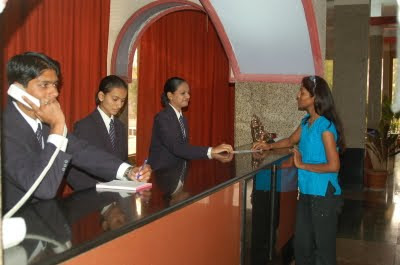
The "Front Office Department" is the major department in a hotel which is situated at the front part of the hotel and it's duty is to sale the rooms of the hotels after registration and hand over key to the guest.
In other word, it is "Show Case Window" of the hotel which reflects the image of a hotel. It is the back bone as well as the "Nerve Center" of a hotel from where all the information and messages are communicated to the different department or personnel. The front office department of a hotel holds first important in view of the nature of a business in a hotel. Revenue collected from the selling of rooms contributes more than 50% of the hotel total sale. Thus, the functions of the front office department is to allocate rooms to the guest and acts as a continuous source of information to the guest staying at the hotel. Other major functions of this department includes settlement of guest account, providing guest service, preparation of guest history card, luggage handling, airport pick-up etc.
The front office department develops and maintains up to date record on guest information, guest service and ensure guest's satisfaction. The front office is also responsible for welcoming the guests, greeting the guest and handling the guest complaints. Hence, the staffs working in the department performs as an actor on the stage. The front office may be divided into more than one section, each of which carry out one or more duties. Basically front office department is divided into Reception, Information, Cashier, Reservation, Telephone operation and Bell desk sections department upon the size, capacity and standard of the hotel establishment.
In other word, it is "Show Case Window" of the hotel which reflects the image of a hotel. It is the back bone as well as the "Nerve Center" of a hotel from where all the information and messages are communicated to the different department or personnel. The front office department of a hotel holds first important in view of the nature of a business in a hotel. Revenue collected from the selling of rooms contributes more than 50% of the hotel total sale. Thus, the functions of the front office department is to allocate rooms to the guest and acts as a continuous source of information to the guest staying at the hotel. Other major functions of this department includes settlement of guest account, providing guest service, preparation of guest history card, luggage handling, airport pick-up etc.
The front office department develops and maintains up to date record on guest information, guest service and ensure guest's satisfaction. The front office is also responsible for welcoming the guests, greeting the guest and handling the guest complaints. Hence, the staffs working in the department performs as an actor on the stage. The front office may be divided into more than one section, each of which carry out one or more duties. Basically front office department is divided into Reception, Information, Cashier, Reservation, Telephone operation and Bell desk sections department upon the size, capacity and standard of the hotel establishment.
 The House-keeping department in a hotel is responsible for creating a
The House-keeping department in a hotel is responsible for creating a  tained. This unit does decor and design, room layout, selecting proper linen, curtains, carpets, flower arrangement etc.
tained. This unit does decor and design, room layout, selecting proper linen, curtains, carpets, flower arrangement etc.